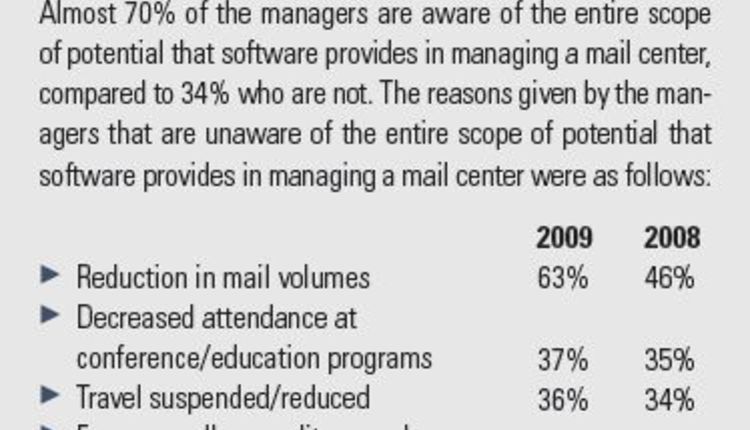1. your commitment to excellence
2. your willingness to spend time and effort in the process
3. that employers understand the value of certification
4. the professionalism of an individual who earns certification
5. the potential for advancement of an individual who earns certification
I would like to give you an overview of the following six certification programs. The requirements vary in the areas of eligibility, knowledge you will be tested on, type of testing, cost and sponsor. Some of these programs also require re-certification after a specific period of time.
>> Certified Mail & Distribution Systems Manager (CMDSM)
>> Certified Mail & Distribution Systems Supplier (CMDSS)
>> Certified Mail Manager (CMM)
>>
>> Mail Design Professional (MDP)
>> Mailpiece Quality Control (MQC)
Certified Mail & Distribution Systems Manager (CMDSM)/ Supplier (CMDSS)
The Mail Systems Management Association (MSMA) sponsors these two programs, the CMDSM and the CMDSS. The emphasis of the CMDSM certification is the mail and distribution systems management side of the industry. The topics you should be knowledgeable of include: USPS mail knowledge, financial management, human resources, mail center design, mail and distribution systems and general management practices.
The CMDSS certification is for the "supplier" side of the industry and incorporates supplier themes as they relate to doing business with mail and distribution management within companies. It incorporates quality assurance, customer relationship management, business ethics, negotiation, selling and presentation skills, USPS mailing regulations and mail and distribution systems knowledge.
An applicant is required to attain 150 points based on work experience, professional activities and education. All qualifying points need to be documented through verification of your employer, educational institutions and proof of activities within associations.
The application fees are $375 for MSMA members and $575 for non-MSMA members. Since the annual membership for MSMA is only $75 for an individual and $175 for a corporate membership (up to three individuals), it makes sense to join MSMA not only for the discount but other benefits as well.
The certifications are valid for a three-year period. Renewal of the certifications requires completion of an application, attaching all certification renewal points documentation and a signed code of ethics form. The renewal fees are $50 for MSMA members and $150 for non-members if you achieve 30 certificate renewal points. Without the points, you must retake the exam, which costs $325 for MSMA members and $525 for non-members.
The CMDSM and CMDSS exams are four-hour computer-based exams with 135 multiple-choice questions and five essay questions. The applicant must attain a 75% or better score to pass. I highly recommend purchasing the study guide that you can get in either a CD or hard copy to prepare for the exam. www.msmanational.org
Certified Mail Manager (CMM)
The In-Plant Printing and Mailing Association (IPMA) sponsors the CMM certification program. The topics you should be knowledgeable of include: general management and skills application, mail management and technical skills, financial management, computer skills, personnel management and communication skills.
An applicant is required to have five years of industry experience and three letters of recommendation. The application fee is $225 for IPMA members and $450 for non-members. Annual membership fees range from $155 for an individual to $620 for a corporate membership (up to 5 individuals). Joining IPMA will give you a substantial discount and provide other membership benefits.
The exam is six hours long, and you must attain a 75% in each section of the exam. Candidates who pass at least two sections are required to retake only those sections failed.
The CMM program requires re-certifiying at five-year intervals. A CMM certification maintenance form requires acquiring 15 certification maintenance credits during the five-year period. The fee is $100 for members and $200 for non-members.
www.ipma.org
Executive Mail Center
Mail Design Professional (MDP)/ Mailpiece Quality Control (MQC)
These three programs are sponsored by the U.S. Postal Service. The EMCM requires three years of direct supervision or management experience and a letter of recommendation from your manager. A bachelor's degree can be substituted for one year of management experience.
The curriculum includes people management, sales and marketing, managing mail center operations, finance, mail center safety and security, planning and managing technology, planning and policy making and total quality management. An open book test is administered at the end of the exam.
The fee at the USPS five-day residency program in
www.usps.com/mailcentermgr/
Mail Design Professional (MDP)
The MDP is a USPS four-day residency program in
www.usps.com/maildesignpro/
Mailpiece Quality Control Specialist (MQC)
This USPS-sponsored program provides a study guide to learn how to design automation compatible mailpieces and reduce postage costs through automation rates. It is very similar to the four-day MDP program noted above. The curriculum includes barcoding specifications and requirements, mail classes and processing categories, addressing and return address information, endorsements, reply mail, permit imprints and hazardous materials.
You can study the guide at your own pace and download the exam from the USPS website when you are ready to take the exam. An individual must score 90% or more to pass the test and be recognized as a MQC Specialist. This is an excellent primer for the CMDSM and CMDSS exams. Marketing Department personnel responsible for the design of mailpieces should also be encouraged to achieve this certification.
The total cost is less than $100 and the certification is valid for a two-year period. http://pe.usps.gov (click mailpiece design)
Tips on Getting Started
The most important thing to do is get started today.
1. Go to the websites and review the qualifying and knowledge requirements for each certification program. Identify which programs might be a short-term goal and those that might be a long-term goal. For example, you can apply for the MQC Specialist today, whereas the CMDSM, CMDSS and CMM will take time to attain the points required and provide the required documentation.
2. Create a file folder for each certification program you have interest in. Print out the application form and file documentation for educational programs, activities and letters of recommendation that qualify for earned points. Make copies of name badges from conferences, copies of earned certificates, etc., for the file.
3. Set a realistic timeline to complete the application with documentation (if applicable) and prepare for the exam. The CMDSM, CMDSS and CMM will require self-study to prepare for the exam whereas the EMCM training is provided during the five-day program, and the exam is open book.
4. Seek mentoring and/or a study group. Check with your local MSMA chapter or PCC group to see if you can get a mentor who has prepared for the exams. Be sure to purchase the study guide for the CMDSM and CMSS exam.
5. Practice essay writing. Good writing skills are imperative in many of the exams and very valuable in your career. There are excellent books, and the CMDSM and CMSS study guides have examples of essay questions and answers you can practice.
6. Become a member of the certification program sponsor. This will give you discounts in some areas with the application fee and make you eligible to earn points for your membership and activities you attend toward your application. You will also broaden your network of industry professionals.
Jacquelyn McPeak, CMDSM, is President of Mail Management Enterprises, LLC, an organization that provides a full range of customized solutions for all areas within mail and distribution services and industry-specific educational programs designed to develop professional mail management skills.




